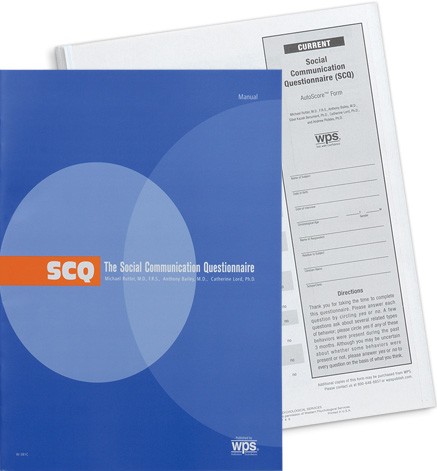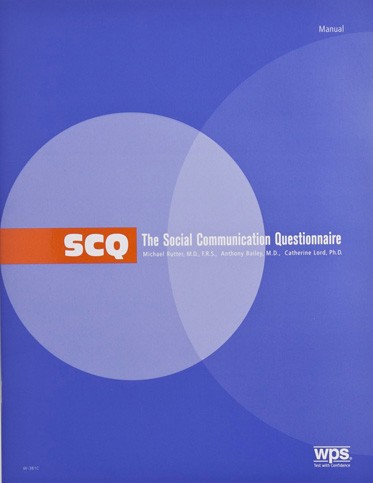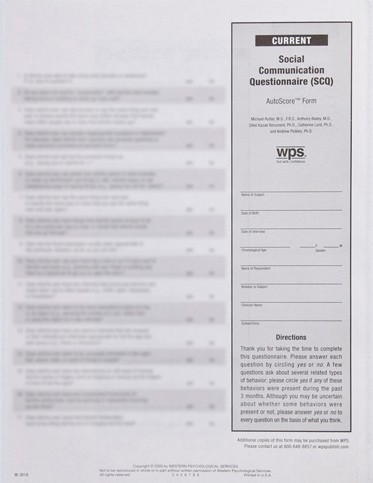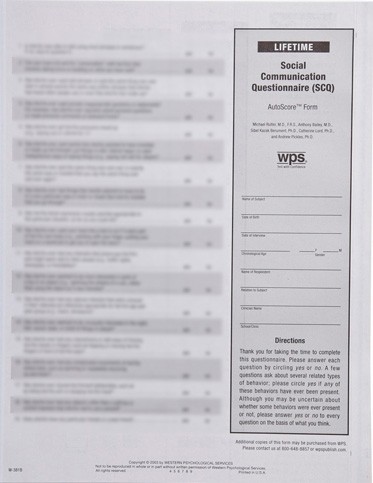Previously known as the Autism Screening Questionnaire (ASQ), this brief instrument helps evaluate communication skills and social functioning in children who may have autism or autism spectrum disorders. Completed by a parent or other primary caregiver in less than 10 minutes, the SCQ is a costeffective way to determine whether an individual should be referred for a complete diagnostic evaluation.
The questionnaire can be used to evaluate anyone over age 4.0, as long as his or her mental age exceeds 2.0 years. It is available in two forms—Lifetime and Current— each composed of just 40 yes-or-no questions. Both forms can be given directly to the parent, who can answer the questions without supervision.
The Lifetime Form focuses on the child’s entire developmental history, providing a Total Score that’s interpreted in relation to specific cutoff points. This score identifies individuals who may have autism and should be referred for a more complete evaluation—with the Autism Diagnostic Interview–Revised (ADI–R) or the Autism Diagnostic Observation Schedule (ADOS), for example. SCQ content parallels that of the ADI–R, and the agreement between SCQ and ADI–R scores is high and substantially unaffected by age, gender, language level and performance IQ. This indicates that the SCQ is a valid screener, providing a reasonable picture of symptom severity.
Moving from developmental history to present status, the Current Form looks at the child’s behavior over the most recent 3-month period. It produces results that can be helpful in treatment planning, educational intervention, and measurement of change over time.
In addition to its screening and educational applications, the SCQ can also be used to compare symptom levels across various groups—children with developmental language disorders, for example, or youngsters with medical conditions typically associated with autism spectrum disorders.
Because the SCQ is brief, quick, easily administered, and relatively inexpensive, it allows clinicians and educators to routinely screen children for autism spectrum disorders. This in turn permits early intervention.
-

Social Communication Questionnaire (SCQ)
SCQ Complete Kit
$288.00 -

Social Communication Questionnaire (SCQ)
SCQ Manual
$142.80 -

Social Communication Questionnaire (SCQ)
SCQ Current Autoscore Form (package of 20)
$93.60 -

Social Communication Questionnaire (SCQ)
SCQ Lifetime Autoscore Form (package of 20)
$93.60 -

Social Communication Questionnaire (SCQ)
SCQ ONLINE Kit
WPS Online Evaluation System
$244.80 -

Social Communication Questionnaire (SCQ)
SCQ ONLINE Manual
WPS Online Evaluation System
$121.20 -

Social Communication Questionnaire (SCQ)
SCQ ONLINE Current Form (20 Uses)
WPS Online Evaluation System
$79.20 -

Social Communication Questionnaire (SCQ)
SCQ ONLINE Lifetime Form (20 Uses)
WPS Online Evaluation System
$79.20
- Copyright 2003

 Proud to be Canadian
Proud to be Canadian